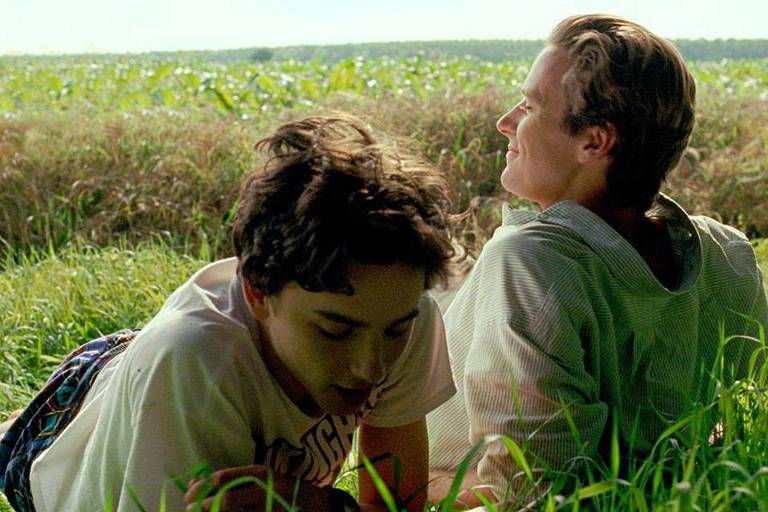The film Call Me By Your Name, adapted from the novel of the same name, is a movie that can tease a variety of feelings out of us.
This film is about the summer of ’83 and a burgeoning relationship between a boy named Elio and a graduate student named Oliver. It’s set in the perfectly gorgeous, idyllic countryside of Northern Italy. This film is what we call a “coming of age” story – it explores the common pains and excitements of adolescence and sexual maturation.

This film is a beautiful quilt of nostalgic snapshots: Summer days spent reclining in the sun, dozing off with a book to radio music. Furtive glances and awkward sentences around crushes. The quiet, clumsy panic of first intimacies. Coming to terms with the reality that not all pain can be resolved with a Hollywood ending, instead pain is simply felt.
When the credits appear on screen, we might be struck with a sudden rush of emotions. This review is meant to help map out what these emotions are, what useful perspectives this film helps us practice, and how we can use films like Call Me By Your Name to learn more about ourselves and bolster our emotional intelligence.
What are the helpful perspectives we gain from Call Me By Your Name?
1. Coming of Age: The Boring Lost Hours

A common complaint (and compliment) for the film is its slow pace. The director, screenplay writer, and cinematographer sit us down to watch a procession of “plot-less” scenes featuring simple life activities before getting to more dramatic moments.
Nothing really happens for long stretches of time in this movie. But if this surprises us we might have forgotten that, at Elio’s age, nothing really happens for long stretches of time in real life.
We are encouraged to feel just how lazy the summer is – to contemplate lazy summers in our own memory. We are pulled in close, witnessing intimate, but un-suspenseful, moments between family, friends, and lovers.

Most importantly, we are encouraged to remember our own youth. When we were young, we dreamed of adventures or excitement, but much of adolescence was spent simply waiting for adulthood. We can watch Elio and remember how bored we were, stuck between childhood and adulthood. The minutes ticked by slowly and unceremoniously back then. Even in our anguish – fumbling with first crushes and heartbreaks – we were surrounded by long lengths of “plot-less” time when nothing particularly amazing or tragic happened.
This film reminds us of those years. The time when we waited and dreamed and dozed off, stuck in that liminal place between inexperience and heartbreak. We are encouraged to not only remember this time, but to recall who we were during those years.
How did we spend the hours when we were Elio’s age? (Or how do we spend them now if we are his age?)
How did they feel?
What did we wish would happen to us?
What has happened?
Was it what we expected?
Thinking about these things is nostalgic, but also slightly painful. We mourn our lost hours from youth – boring as they felt, they were simple and beautiful.
A film like Call Me By Your Name reminds us that youth can feel both urgently ecstatic, painful, and boring at the same time. By showing this truth, older audiences get some help reflecting on their own lost hours, finding beauty and value in them. Younger audiences are consoled that the slow pace of their lives is natural, despite the action they see teenagers in movies and TV shows routinely get involved in.
2. First Love and First Intimacies
This is the most salient theme of the story. This is a story about Elio’s first significant encounters with infatuation, romance, and sex.
This film is exceedingly realistic in its portrayal of sexuality. There are more than a couple controversial scenes and themes in this film and its source material, however, how passion and intimacy are portrayed through Elio in the movie can be quite consoling.
Elio struggles to control his feelings for much of the film. Although he appears stoic or even cavalier around Oliver, we can glance his true feelings scrawled in his notebook or in a well-timed wince. The observant audience member can sense (in Timothee Chalamet’s breakout performance) the volcanic rumblings of insecurity and obsession churning under the surface. We can also recognize this in ourselves. We revisit who we have been in our infatuations – the overwhelming insecurity and awkwardness. Watching this written and portrayed so realistically helps soothe our worries that we are abnormally clumsy in our attraction or that we are uncommonly afflicted by fear or anxieties in love.

As the film progresses, Elio expresses his sexuality in surprising ways that might both embarrass and give solace to the audience. Sex is an alarming and shameful topic for many, subsequently movie-makers try to avoid realism, often manicuring and choreographing sex into unrealistic and one-size-fits-all scenes that are over quickly, vaguely, and quietly. Call Me By Your Name, however, encourages the audience to actually think about sex and sexuality for a while in a compassionate and realistic way.
In private moments with Elio we witness a young person experimenting with sexual desire and struggling with sexual shame in ways that might find quite relatable. We’re invited to share Elio’s secrets – secrets that might remind us of our own. Even if we are a little squeamish, after seeing Elio and his familiar experiences, we can feel suddenly less alone or abnormal for our sexual experiments or our own un-Hollywood sexual habits. Reflecting on this, we might feel the weight of our sexual shame lighten a little.
3. Letting Pain Happen

The lasting impression of the film, as summarized by Elio’s father in the final chapter of the film, is that the feelings that overwhelm us on our journey to emotional maturation do not need to be silenced or fixed.
Instead, we are offered the comforting perspective that our pain is useful. It is the counterbalance for our joy. As we mature it is important to develop perspectives and psychological tools to better process our negative emotions, but our negative emotions are not our enemy. They need to be felt and processed – not scrubbed out of our minds or repressed.
With this perspective in mind we can digest the ending of the film with a calm acceptance and even appreciation of Elio’s – and our own – grief. We understand that the pain is a part of a larger journey, it does not need to be edited out or fixed by grand romantic gestures. If we are mindful of this perspective even after finishing the film we might benefit from the understanding that our own sorrows, in the past, present, and future, are valuable for their contribution to our emotional maturation and strength of character.
Overall, Call Me By Your Name is a deeply compassionate film that offers us important realistic perspectives on maturation, sexuality, and sorrow – it avoids common tropes, offering us much needed insight into some of the more embarrassing and confusing parts of growing up. Films like this help us feel less alone, less strange, and more mindful of processing the struggles we’ve had during our own coming of age.
Thank you for reading!
This blog, Screen Therapy, is dedicated to exploring how we can mindfully use the time we already spend on games and movies to strengthen our emotional intelligence. Emotional intelligence is crucial when we face the everyday stresses and anxieties we all endure (such as the fear of death, how to develop the skills for loving relationships, or learning how to cope with just how difficult life feels, etc.)
We receive very little formal education or help in processing these difficult challenges, but by strengthening our self-knowledge and emotional intelligence through art and culture we can better pursue our personal balance.
